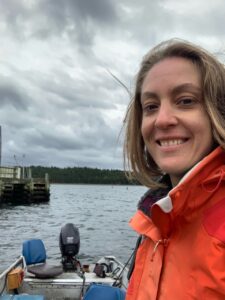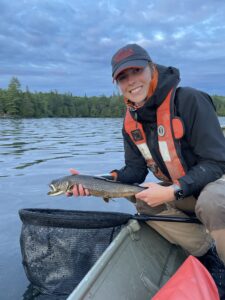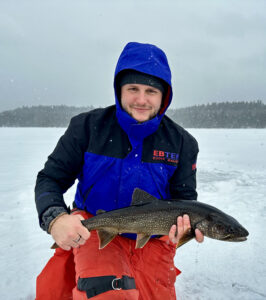Larkin Award
The Peter A. Larkin Award for Excellence in Fisheries at a Canadian Institution is given yearly to two deserving graduate students (one PhD student and one MSc student). The award recognizes one of Canada’s great fisheries scientists who was passionate about students. The Peter A. Larkin Memorial Fund was established in memory of Peter Anthony Larkin, C.M., O.B.C., F.R.S.C.; M.A. (Sask.), D.Phil. (Oxon), D.Sc. (UBC), University Professor Emeritus, world-renowned leader in fisheries science, and an active and honoured member of the American Fisheries Society (more about Dr. Larkin can be found here). Successful applicants will be chosen by CARS based on academic qualifications, a proposal of their research, and their AFS involvement.
Applications are OPEN for the Larkin Award. The purpose of the award is to identify the top current Masters and PhD level students that are conducting fisheries research at a Canadian institution. The award is not restricted to students with Canadian citizenship. For specific details and to download the application instructions, click here.
Deadline: June 14, 2024 at 4PM EDT.
The award is administered and supported by the Canadian Aquatic Resources Section (CARS) of the American Fisheries Society (AFS). To be eligible for the award, you must be a current member of AFS (go to fisheries.org). You can join at the time of applying to this award. We also encourage you to check the box to be a CARS member in the AFS application form, which comes as no additional cost for students. Note if you are already an AFS member but didn’t know about CARS, you should be able to make changes to your membership by logging into the AFS membership page.
2023 Larkin Award Results
In 2023, we received 16 applications for the Larkin Award (10 PhD and 6 MSc). The Larkin Award program is run by Dr. Sarah Lehnert (DFO). Thanks to our judges for the award, who in 2023 were Drs. Tony Kess (DFO), Farrah Chan (DFO), Clare Venney (Universite Laval), and Rowshyra Castaneda (DFO).
Winner (PhD level): Kayla Hamelin

I am a PhD Candidate at Dalhousie University, co-supervised by Dr. Megan Bailey
(Marine Affairs Program) and the late Dr. Jeff Hutchings (Department of Biology). My
interdisciplinary doctoral research broadly investigates fisheries in Atlantic Canada as
social-ecological systems, and explores implications for engagement with stakeholders
and rightsholders in both fisheries science and fisheries management processes.
In many contexts around the world, fisheries management remains a ‘wicked problem’,
plagued by complexity in efforts to obtain credible information upon which to make
decisions, establish legitimacy in governance processes, and achieve objectives for
ecological, economic, social, and institutional sustainability. Understanding how different
actors in the fisheries governance process may work together to combine sources of
information and bridge knowledge types is foundational to enhancing ‘evidence-based’
decision-making toward full-spectrum sustainability. With a focus on fisheries in Atlantic
Canada, the goal of my thesis was to explore approaches to scientific inquiry that result
in both a more holistic assessment of the fishery system and more transparency and
inclusion in decision-making processes, setting the stage for ‘win-win’ scenarios for both
human communities and the natural world in which they are embedded.
I first explored recent Fisheries Act amendments regarding “Decision-making criteria” to
assess current science-policy and advisory processes at Fisheries and Oceans
Canada. I identified the extensive, albeit sometimes superficial, engagement of the
fishing ‘industry’ in information-gathering processes, an apparent under-representation
of Indigenous knowledge informing management, and a strong focus on biological and
ecological dimensions of fisheries guiding all scientific and broader advising processes.
In subsequent chapters, I used recreational fishing of Atlantic mackerel as a case study,
firstly to estimate patterns and volumes of catch from the recreational sector to address
data gaps, and then to explore the social and cultural dimensions of fisheries by
identifying fishing community members and their motivations for recreational mackerel
fishing. Finally, my exploration of current DFO advising practices, combined with my
practical experience learning from fish harvesters, led to the need to craft a potential
working definition of ‘community knowledge’ for decision-making, as referenced in the
Fisheries Act.
Community knowledge can contribute both data for operational aspects of a fishery as
well as perceptions, values, and norms essential to higher-level strategic aspects of
management. A common thread throughout my research is the underappreciated
(potential) value of community knowledge in fisheries management. This potential is not
just idealized, but is in fact legislated, and may represent a cornerstone in achieving full-
spectrum sustainability for fisheries in Atlantic Canada.
Runner-up (PhD level): Erin Stewart

I am a Ph.D. Candidate at Trent University co-supervised by Dr. Graham Raby (Trent U.) and Dr. Chris Wilson (Ontario Ministry of Natural Resources and Forestry). My research focuses on intraspecific variation in thermal tolerance of brook trout (Salvelinus fontinalis).
Brook trout, Ontario’s beloved native stream salmonid, is facing numerous threats in its native range, largely resulting from increasing water temperatures. Brook trout is a ‘coldwater generalist’ that is successful at a wide range of cold habitats and exhibits diverse life histories and ecotypes. Although well-studied, there are key gaps about brook trout biology that must be addressed to better plan for the effects of climate change at the species and population level. Brook trout populations are exposed to diverse climatic conditions across the species’ (now global) geographic range. It’s likely that populations are locally-adapted, so knowing what traits are driving differences in thermal tolerance will be key to understanding how brook trout can cope with climate change.
I study brook trout thermal tolerance across life stages, seasons, ecotypes, and genetically distinct populations to provide a more detailed, context-specific quantification of thermal tolerance using multiple methods. I have reared brook trout under variable thermal regimes to determine thermal stress effects on survival during incubation. I have measured critical thermal maximum in lab and field settings to both quantify the effects of acclimation and determine the relative differences among populations, and I am now studying plasticity in the metabolic response to thermal change using respirometry, again among populations. I am also analyzing differences in thermal stress and lifetime thermal history using molecular genetic markers and microchemistry of otoliths. Conducting research on wild brook trout across Ontario has meant collaborating and consulting with the Ministry of Natural Resources and Forestry, the Algonquins of Ontario, Ontario Parks, numerous conservation authorities, and private landowners to facilitate access and responsible use of wild populations.
So far I’ve found that while acclimation (i.e., plasticity) has a strong influence on thermal tolerance, genetic variation is a key driver as well. Moving forward, I hope to identify physiological traits involved with thermal tolerance that are variable among populations and determine how responsive these traits are to changing conditions. This will allow me to discern the risk populations face and their ability to cope with short- and long-term changes in temperature.
My research will provide insight into how physiological traits interact with both stochastic and stable environmental conditions to influence organismal thermal tolerance. I hope to improve our understanding of the physiological mechanisms that drive intraspecific variation in fish thermal tolerance across life stages, life histories, and seasons, and therefore also the long-term potential for coping with changing climate conditions.
Winner (MSc level): Miguel Eduardo Felismino

Hi! My name is Miguel Felismino and I recently completed my M.Sc. degree at Concordia University under the supervision of Dr. Grant Brown. Broadly, my research and professional goals revolve around the study of plastic pollution, identifying its sources, fate and effects on the biota. For my masteral research, I focused on the diverse impacts of microplastic pollution on juvenile convict cichlids (Archocentrus nigrofasciatus).
Pollution is the price of progress; or at least it has been for most of human history. Global plastic production and use has been increasing in the past decades which has ultimately led to widespread plastic pollution. A large part of this global plastic issue can be attributed to smaller pieces of plastics such as microplastics (particles between 1 micron to 5 mm in size) which come either from the breakdown of large plastics or directly from various sources. These widespread contaminants are ubiquitous in the environment and are known to be consumed by organisms leading to a variety of adverse effects.
Microplastics have been found to cause digestive tract issues in freshwater fish including physical blockages and lacerations. These issues could have consequences on the food and nutrient absorption which could then have impacts on the fish’s growth, behaviour and decision-making. My experiment was designed to provide empirical evidence for this framework. We conducted laboratory experiments focused on identifying the effects of microplastic consumption on the growth, foraging and competitive interactions of juvenile convict cichlids and its effects on their behaviour and cognition. We manipulated the levels of microplastic exposure of juvenile convict cichlids by feeding them brine shrimp exposed to varying, environmentally relevant, concentrations of polyethylene microplastic spheres. During these feedings, we analyzed the cichlids’ foraging behaviour, competitive interactions and measured their growth. We also analyzed the impacts of microplastics on the cichlids’ exploratory behaviour and cognitive ability by observing their performance through a simple two-day maze trial.
We found that the consumption of virgin polyethylene microplastics affected the cichlids’ cognition and exploratory behaviour but not their growth, foraging rates or competitive interactions. Additionally, we found that these effects were being observed despite the cichlids readily egesting most of the plastics within 24 hours! These results improve our general understanding of the consequences of plastic pollution on the biota and highlight the need for more studies to further understand the mechanisms behind its impacts on the behaviour and cognition of fishes. This work has now been submitted for publication and I can’t wait to share it in great detail with everyone!
Runner-up (MSc level): Brett Studden
Hello everyone, my name is Brett Studden, and I am a PhD student (recently transferred MSc) at the University of Toronto under the supervision of Dr. Bailey McMeans. My doctoral research combines several innovative monitoring technologies, including acoustic telemetry, stable isotopes, and genetic analysis, to shed new light on the ecology of freshwater fishes in Canadian inland lakes.
Freshwater environments carry a disproportionately large percentage of the world’s biodiversity despite covering only a small proportion of the earth’s surface, making them a critical source of life and a fruitful opportunity to uncover the hidden wonders of the natural world. Canada’s abundant lake and river systems are home to a broad diversity of taxa, including one of my favourite groups, freshwater fish. Fishes are often considered to have high commercial, recreational, cultural, or ecological value. Yet, many noteworthy details about their biology and behaviour remain unknown, especially when considering the effects of environmental change.
These sentiments and more are encapsulated by a newly founded collaborative research project based out of Algonquin Provincial Park that brings together researchers, government partners, and indigenous knowledge holders to study high-resolution, multispecies ecology across a gradient of lake size. In support of this project, my research to date examines how co-occurring predatory species alter their daily movement patterns on an annual basis. Using lake trout, smallmouth bass, and burbot as study species, this work highlights the remarkable flexibility of diel rhythms and investigates the factors underlying the maintenance of niche overlap among sympatric predators.
Freshwater environments are often highly dynamic, with abiotic and biotic conditions fluctuating in space and time. As a result, my upcoming research seeks to explore how these fluctuations govern species behaviour, movement, and interactions. For example, many fishes utilize nearshore prey species as an important resource. Yet, little is known about how these prey communities alter their distributions through time and what cascading effects these may have on trophic interactions and other important ecological processes like habitat coupling. Our system also presents a unique opportunity to examine the importance of lake connectivity for freshwater fishes. The degree to which fishes travel between lakes is largely unknown but may allow species to access alternative resources, avoid harsh environments, and exchange genetic information. As such, this research will provide novel insights into the ecology of fishes that may change the way we conserve and manage freshwater environments.


